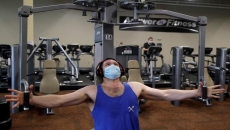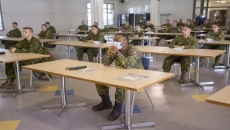VANCOUVER - It's too early to drop all COVID-19 restrictions, including proof of vaccination at indoor venues, as infections rise in British Columbia due to a "let it rip" approach for managing the virus, a retired emergency room doctor says.
Dr. Lyne Filiatrault said the end of the vaccine card on Friday after masks were no longer required earlier this month sends the wrong message as the highly transmissible BA.2 subvariant of Omicron is spreading quickly.
"We think there's going to be another BA.2 wave and we don't think it's going to be any different than what other jurisdictions are seeing, like Ontario and Quebec, because we're making the same errors," said Filiatrault, who speaks for Protect Our Province BC, a group of health-care professionals, scientists and advocates calling for evidence-based policies.
However, Ian Tostenson, president of the BC Restaurant and Foodservices Association, said there's no longer a need for the vaccine card in a province where 91 per cent of residents aged 12 and up have received two doses of a vaccine.
"It was more really about providing an incentive for people to get vaccinated," Tostenson said.
He said he believes 99 per cent of restaurants will no longer check for vaccination status even if they can choose to continue taking the step.
The vaccine card was never required in fast-food establishments, which have not been cited as having outbreaks, he said, adding extra vigilance around sanitation is likely to continue in some restaurants.
Filiatrault said sanitation isn't the main issue involving a disease that is spread through the air, though ventilation still has not been highlighted as important, especially as BA.2 is highly transmissible.
People with two doses of a vaccine should no longer be considered "fully vaccinated" when that leaves others vulnerable to reinfection with COVID-19, as seen in jurisdictions like England, she said.
Some in her group advocated for third doses to be included on vaccine cards, Filiatrault said.
Provincial health officer Dr. Bonnie Henry announced this week that fourth doses will be administered to people aged 70 and up, those who are extremely immunocompromised and Indigenous people aged 55 and over as protection from doses administered six months ago is waning.
Henry also said about 50 per cent of the population has now developed immunity to COVID-19, either through vaccination or an infection.
Filiatrault said she's concerned about a rise in hospitalizations, the same as in England, where restrictions were lifted too quickly and people were reinfected with COVID-19.
Fifty-nine per cent of British Columbians aged 18 and up have received a third dose of vaccine, which Filiatrault said isn't high enough as BA.2 spreads.
Henry has also announced that weekly, not daily, data will now be provided on the number of hospitalizations, for example, but Filiatrault said that leaves people uninformed about the state of the virus as the pandemic continues.
Surveillance of wastewater will keep providing a picture of how much of the virus is in the community, Henry said, but it's currently being done only in the Lower Mainland.
Photo courtesy of IStock.






